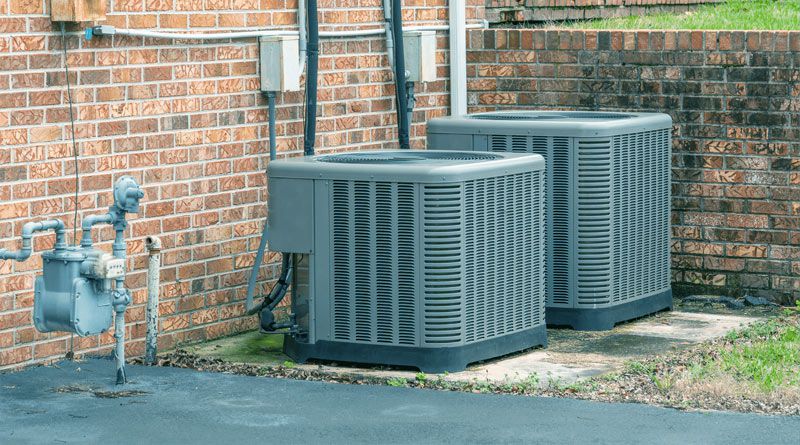Smoke emanating from your HVAC (Heating, Ventilation, and Air Conditioning) system can be an alarming and potentially hazardous sign. It often indicates a malfunction within the unit that could range from a minor issue to a critical safety risk.
Ignoring it compromises the system’s efficiency and lifespan and causes a serious threat to the health and safety of the occupants inside the building.
So, if you’re seeing smoke, play it safe and call your local HVAC company before it turns into a real inferno.
Overheated motors
Overheated motors are one of the primary culprits of smoke in an HVAC system. These motors tirelessly power the fan that circulates air throughout your building. When they overheat, it’s often due to excessive strain, inadequate maintenance, or a failure in the motor’s internal components.
The insulation on the wiring can melt, resulting in smoke and a burning smell. If left unaddressed, this can lead to an electrical fire, causing substantial damage to the HVAC system and potentially the entire building. Therefore, recognizing and responding promptly to signs of an overheated motor in your HVAC unit is crucial for maintaining safety and avoiding costly repairs.
Electrical issues
Electrical problems within an HVAC system, such as short circuits or faulty wiring, are critical concerns that can lead to the emission of smoke. These issues may arise from wiring that has deteriorated over time, incorrect installations, or components that have become damaged.
Short circuits can create sparks or excess heat, igniting surrounding materials and causing smoke. Ignoring these electrical signs risks further damage to the HVAC system and can pose a serious fire hazard. Immediate attention from a qualified professional is essential to diagnose and rectify any electrical concerns, ensuring the occupants’ safety and the unit’s longevity.
Dust build-up
Over time, dust and debris can grow on the heating elements, air filters, and other components. When the HVAC system is activated, these particles can get heated up to the point where they burn, producing smoke and an accompanying burning odor. While this may seem like a minor inconvenience, it is essential to pay attention to it.
Excessive dust build-up can strain the system, reduce its efficiency, and lead to premature failure. Moreover, it can pose a fire risk and seriously degrade indoor air quality, potentially leading to respiratory issues for occupants. Regular maintenance and cleaning are key to stopping dust-related problems in your HVAC system.
Refrigerant leaks
These leaks occur when the coolant substance, essential for the HVAC’s operation in regulating air temperature, escapes from its designated coils or pipes. When the refrigerant comes into contact with hot components of the system, it can produce a gas that may appear similar to smoke and can be harmful if inhaled.
Not only does this reduce the efficiency of your HVAC unit, requiring it to work harder and increasing energy costs, but it also creates environmental and health dangers due to the toxic nature of many refrigerant gasses.
Immediate action is necessary when a refrigerant leak is suspected to protect occupants from potential poisoning and to prevent further damage to the unit that can be cost-prohibitive to repair. Regular inspections by a certified technician can aid in detecting leaks early and maintaining the well-being and safety of both the system and its users.
Malfunctioning capacitors
Capacitors in an HVAC system act as a short-term power storage mechanism to assist in starting and running the motors. When these capacitors malfunction, it can lead to overheating or power surges that cause excess energy to be released in the form of heat and smoke.
This is often accompanied by a distinctive electrical burning odor or even a loud humming or buzzing sound from the unit. Ignoring a failing capacitor is risky; it not only impedes the system’s performance, potentially causing other components to work harder and fail prematurely, but it can also result in an electrical fire.
Immediate action to replace a bad capacitor is crucial to prevent damage to your system and ensure the safety of the building’s inhabitants. Regularly scheduled maintenance can help identify and rectify these issues before they escalate into major concerns.
Oil burner issues
Oil burner issues in an HVAC system are another significant reason smoke might be present. If the burner is dirty or improperly adjusted, it can lead to incomplete combustion, producing smoke. The most common signs of an oil burner problem include soot build-up, an oil smell, and visible smoke emissions.
When the oil does not burn correctly, it can create a dangerous build-up of carbon monoxide. This colorless and odorless gas can cause major health issues or even fatalities among building occupants. Additionally, if these issues are not addressed promptly, they could lead to deterioration of the heat exchanger, which is costly to repair or replace. It is crucial to have regular check-ups and maintenance performed by a certified HVAC technician to keep oil burners clean and properly adjusted, ensuring the safe and effective function of your heating system.

Namaste UI collaborates closely with clients to develop tailored guest posting strategies that align with their unique goals and target audiences. Their commitment to delivering high-quality, niche-specific content ensures that each guest post not only meets but exceeds the expectations of both clients and the hosting platforms. Connect with us on social media for the latest updates on guest posting trends, outreach strategies, and digital marketing tips. For any types of guest posting services, contact us on info[at]namasteui.com.

